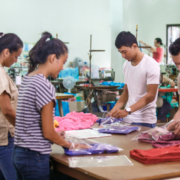NCL Applauds DOL’s Efforts to Hold Corporations Accountable When It Comes to Child Labor Violations
/in Child Labor - US, Enforcement--US, News & Events, Press Releases, U.S. DOL/by Reid Maki
Media Contact: Lisa McDonald, Vice President of Communications, (202)- 207-2829
Washington, D.C. – Today, the National Consumers League (NCL) applauds the U.S. Department of Labor (DOL) for their recent efforts to combat unlawful child labor practices, following several significant enforcement actions in the past week. These recent actions demonstrate the Department’s commitment to holding corporations accountable for violating child labor laws and protecting vulnerable young workers from exploitation.
“NCL commends the Biden Administration’s Department of Labor for these landmark actions,” said Reid Maki NCL Director of Child Labor Advocacy. “These agreements not only hold corporations responsible for their violations but also set a clear precedent for others to follow in ensuring that children are not subjected to dangerous, illegal labor.”
This month’s actions by the DOL’s Wage and Hour Divsion:
Cleaning Contractor Pays $400,000 in Penalties: The DOL reached an agreement with a Tennessee cleaning contractor, requiring the company to pay $400,000 in civil penalties and take proactive steps to prevent child labor violations. The company will implement new policies, including monitoring and auditing to ensure children are not employed in hazardous jobs, and provide a toll-free number for reporting concerns. Additional information here.
Perdue Farms and Staffing Agency Address Violations: The DOL reached an agreement with Perdue Farms and a temporary staffing agency, SMX, following an investigation into child labor violations at Perdue’s poultry processing facility in Accomac, Virginia. This agreement outlines measures to prevent child labor violations and ensure compliance with federal child labor laws. Additional information here.
JBS USA Takes Responsibility for Child Labor Violations: The DOL secured an agreement with JBS USA, the nation’s largest meatpacking processor, to address child labor violations in its supply chain. JBS will pay $4 million to support individuals and communities affected by illegal child labor and launch an awareness campaign to educate the public on the dangers of child labor. The funds may provide immediate assistance to affected individuals and community organizations in the form of scholarships, stipends and educational aid including assistance to community organizations to fund English as a Second Language teaching positions, literacy, job training and housing. Additional information here.
Little Caesars Franchisee Fined for Child Labor Violations: A Little Caesars franchise in Farmington Hills, Michigan, was found to have employed minors to operate dangerous equipment such as dough mixers and ovens. The company also violated child labor laws by allowing three 15-year-olds to work past 7 p.m. on school nights. The franchisee was penalized $26,000 as part of the settlement. Additional information here.
During the last two years, as hazardous child labor spread to factories and meatpacking plants across the U.S., the Wage and Hour Administration has invoked an arrange of innovative strategies to help reduce child labor and to protect vulnerable children. Those strategies have included using “hot goods” mechanisms, reformulating child labor fines, funneling resources to child labor victims.
NCL continues to advocate for stronger protections for children and workers across the country, urging lawmakers, businesses, and consumers to join in the effort to eliminate child labor in all forms.
###
About the National Consumers League (NCL)
The National Consumers League, founded in 1899, is America’s pioneer consumer organization. Our mission is to protect and promote social and economic justice for consumers and workers in the United States and abroad. For more information, visit nclnet.org





